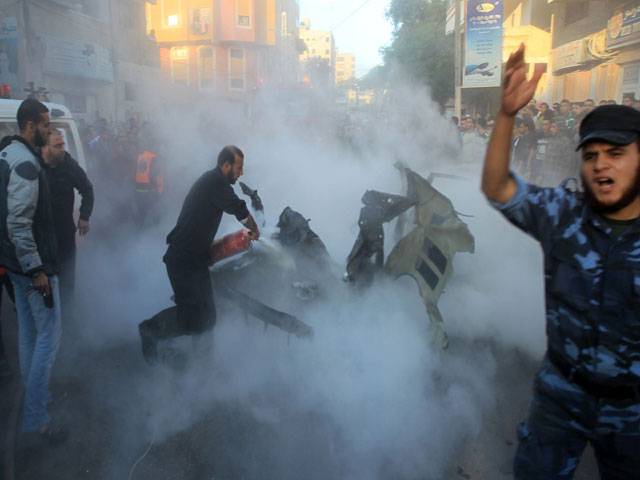GAZA CITY - Israel killed a top Hamas military commander in a targeted strike on Gaza City Wednesday, prompting outrage from fighters who said the Jewish state had opened “the gates of hell.”
Israel confirmed it had targeted Ahmed Jaabari in an air strike on a car, warning it was only the start of an operation to target ‘militant’ groups which was launched as the Jewish state prepares for general elections in January. It also warned it was prepared to launch a ground operation “if necessary.”
Following the initial strike, which killed Jaabari and his bodyguard, Israel pounded the strip with more than 20 air strikes, killing another six people, two of them children, and injuring 30, Hamas health minister Mufid Mukhalalati said in a televised press conference at Shifa hospital in Gaza City.
The air strikes followed a weekend of bloodshed, which saw Israel kill seven Palestinians as fighters fired more than 120 rockets over the border.
Jaabari’s death sparked furious protests in Gaza City, with hundreds of members of Hamas and its armed wing, the Ezzedine al-Qassam Brigades, chanting for revenge in and around the Shifa hospital where his body was taken. Jaabari’s bodyguard was also killed in the initial strike which took place shortly before 4:00 pm (1400 GMT), medics said.
The Israeli army said it had targeted “a significant number of long-range rocket sites” and was prepared to launch a ground operation if necessary in order to stamp out rocket fire.
“All options are on the table. If necessary, the IDF (army) is ready to initiate a ground operation in Gaza,” the military said on its official Twitter account.
Israeli police spokesman Micky Rosenfeld said police had raised the alert around Gaza “in anticipation of potential retaliatory attacks” and said that five rockets had hit Israeli immediately after the strike on Jaabari.
Egypt’s Foreign Minister Mohammed Kamel Amr condemned the Israeli air strikes and called for an “immediate stop” to attacks on the Palestinian territory, warning against “escalation and its possible negative effects on regional stability.”
Britain called for restraint while the United States said it is closely watching developments in Gaza.
Israeli army spokeswoman Avital Leibovich said the air strikes were just the start of an operation targeting Gaza fighters which had been authorised by Israel’s Chief of Staff Lieutenant General Benny Gantz.
“After the rocket fire of recent days, the chief of staff has decided to authorise the targeting of terrorist organisations in the Gaza Strip,” she said, adding, “This is the beginning.”
After the strike on Jaabari, Israeli forces had hit “close to 20 targets” used for launching rockets, especially those with a range of 40 kilometres (25 miles) or longer. The strikes, she said, had caused “significant damages” to Hamas and Islamic Jihad’s infrastructure.
The strike prompted an outpouring of grief and anger, with armed men firing weapons into the air outside Shifa hospital in Gaza City, and mosques throughout the city calling prayers to mourn the commander’s death.
The Qassam Brigades issued a furious communique in response to Jaabari’s death, saying Israel had “opened the gates of hell on itself.” And Fawzi Barhum, a spokesman for the political wing of the ruling Islamist movement said it was tantamount to a “declaration of war.”
“The occupation committed a dangerous crime and crossed all the red lines, which is considered a declaration of war,” he said in a statement, adding, “The occupation will pay dearly for this and we will make it regret the moment they thought about it.”
Meanwhile, witnesses reported seeing dozens of Israeli tanks massed along the border east of Gaza City.
Israel Ziv, former head of the army’s Gaza division, said the strike was “a very clear message to Hamas.” “This is the beginning of a larger operation that will go on for the next few days,” he told reporters. “There will surely be an escalation.”
2008, when the Jewish state was about to go into elections.
The military’s last large-scale operation in Gaza began at the end of December 2008, when the Jewish state was about to go into elections.
The 22-day war killed 1,400 Palestinians - half of them civilians - and 13 Israelis, 10 of them soldiers.
Friday, April 19, 2024
Hamas chief killed in Israeli strike

8:27 AM | April 19, 2024
8:09 AM | April 19, 2024
Minister reviews naan, roti prices
April 19, 2024
ETPB land worth Rs 40b retrieved so far
April 19, 2024
Lahore revamping plan to complete by June 30
April 19, 2024
CCPO reviews security for by-elections, NZ cricket matches
April 19, 2024
A Tense Neighbourhood
April 19, 2024
Dubai Underwater
April 19, 2024
X Debate Continues
April 19, 2024
Hepatitis Challenge
April 18, 2024
IMF Predictions
April 18, 2024
Kite tragedy
April 19, 2024
Discipline dilemma
April 19, 2024
Urgent plea
April 19, 2024
Justice denied
April 18, 2024
AI dilemmas unveiled
April 18, 2024
ePaper - Nawaiwaqt
Advertisement
Nawaiwaqt Group | Copyright © 2024





